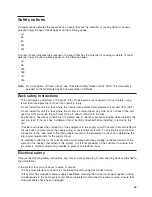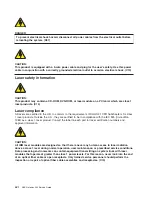
System features
This section describes the features of the NAS Gateway 500.
Bus architecture
The NAS Gateway 500 has six PCI-X slots available. The slots are 64-bit capable at 133 MHz, 3.3 volts.
All slots are capable of using the full-length PCI-X adapters. The PCI-X slots are numbered on the back of
the chassis, from left to right.
The NAS Gateway 500 includes dual integrated Ultra3 SCSI controllers, dual 10/100 Mbps integrated
Ethernet controllers, and four front-accessible disk bays supporting up to two hot-swappable disks. Only
one drive is used if mirroring feature code is not installed. Otherwise, two hard disk drive bays are used.
Hard disk drives are used
only
for the operating system. Two hard disk drive bays remain unused. The
hard disk drives are 36.4 GB, 10 000 rpm Ultra 3 SCSI drives. The two media bays are used for a
CD-ROM and a diskette drive. The Converged Service Processor 2 (CSP), including system power control,
is also integrated, along with the native I/O functions such as serial ports.
The following figure shows the PCI-X adapter slot locations when viewing from the back of the system.
1
PCI-X adapter slot locations
Processor books
v
Each NAS Gateway 500 has one or two processor books. The processor books are mechanical
assemblies that contain a two-way processor card. Each of the two processors on this card has a
dedicated 8-MB L2 cache, and these processors share a common 64-MB L3 cache.
v
L3 cache capacity per processor configuration:
– Two-way configuration = One L3 chip with a 64-MB cache capacity
– Four-way configuration = One L3 chip per processor book and two processor books, yielding a total
of 128-MB cache capacity
Note:
A two-way processor node is made up of a single processor book, and a four-way processor node
is made up of two processor books.
Memory
v
4-GB to 32-GB error correction code (ECC) double data rate (DDR) 100 MHz synchronous dynamic
random-access memory (SDRAM).
v
Dual in-line memory modules (DIMMs) plug into the processor cards (eight DIMM slots per card).
v
DIMMs can be populated singly or in quads (four DIMMs). A memory feature consists of a quad. See 4
and Table 5 on page 12 for valid memory configurations.
v
A system with a single processor book (a two-way processor node) can have a maximum of 16 GB of
memory, and a system with a dual processor book (a four-way processor node) can have a maximum of
32 GB of memory.
2
1
2
3 4 5 6
1
2
NAS Gateway 500 Service Guide
Summary of Contents for TotalStorage NAS Gateway 500
Page 1: ...IBM TotalStorage NAS Gateway 500 Service Guide GY27 0418 00 ...
Page 2: ......
Page 3: ...IBM TotalStorage NAS Gateway 500 Service Guide GY27 0418 00 ...
Page 16: ...xiv NAS Gateway 500 Service Guide ...
Page 20: ...xviii NAS Gateway 500 Service Guide ...
Page 36: ...System logic flow Note Not all components are supported 16 NAS Gateway 500 Service Guide ...
Page 52: ...32 NAS Gateway 500 Service Guide ...
Page 58: ...38 NAS Gateway 500 Service Guide ...
Page 112: ...92 NAS Gateway 500 Service Guide ...
Page 266: ...246 NAS Gateway 500 Service Guide ...
Page 326: ...306 NAS Gateway 500 Service Guide ...
Page 353: ...Chapter 11 Removal and replacement procedures 333 ...
Page 392: ...372 NAS Gateway 500 Service Guide ...
Page 402: ...382 NAS Gateway 500 Service Guide ...
Page 412: ...392 NAS Gateway 500 Service Guide ...
Page 440: ...420 NAS Gateway 500 Service Guide ...
Page 446: ...426 NAS Gateway 500 Service Guide ...
Page 448: ...428 NAS Gateway 500 Service Guide ...
Page 466: ...446 NAS Gateway 500 Service Guide ...
Page 469: ......
Page 470: ... Printed in U S A GY27 0418 00 ...
Page 471: ...Spine information IBM TotalStorage NAS Gateway 500 NAS Gateway 500 Service Guide GY27 0418 00 ...
















































